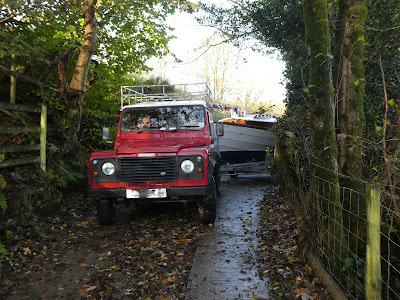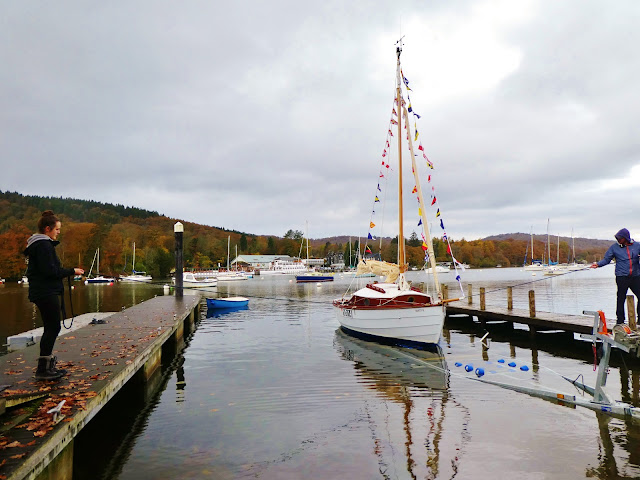Saturday, 23 November 2019
Monday, 11 November 2019
The Launch
Despite
the fact that I have applied the utmost care, attention and accuracy throughout the
build so therefore confident that every joint was perfectly fitted, glued and sealed, I was nonetheless slightly anxious about the transportation to nearby
Lake Windermere and of course the launch itself. A cold damp Saturday morning 2nd
November 2019 was chosen as judgement day with the family in attendance as
helpers and spectators.
The
first test was to confirm that my calculations were correct (or otherwise) in
that I was actually able to negotiate the tight restricted access from our
property to the public carriageway which, in the event passed without a hitch.
A setting up period of two hours at the lakeside was longer than I had
anticipated, although I expect that with practice I can improve on this and have already identified some areas where improvements can be made to speed
things up. The actual launch and recovery on the concrete slipway was a lot easier than I had expected, once reversed into the lake she virtually
floated off the trailer and I eased her off single handed. Any concerns that I
had previously harboured about the whole process simply evaporated once she
floated free, she sat in the water perfectly on her designed lines and looked a
pretty picture.
It
was a dead calm autumn day with not a breath of wind so we were restricted to
only using the motor, I rigged the sails but they were not hoisted being surplus
to requirements. Nonetheless we cruised around the lake for a couple of hours
with my granddaughters taking turns on the tiller. Everything worked and seemed
spot on with no leaks or apparent faults. The recovery back onto the trailer
was dead easy too. Following this day of testing I will lay her up for the
winter and carry out a full public launch next spring with the benefit of longer daylight
hours and the prospect of better weather.
The
only issues I experienced were with the transportation. The aft mast support
that I had designed and constructed did not perform as I had expected. Once
mobile the trailer can generate some bounce which was particularly
prevalent on the rough roads around the area in which I live, this in turn
generated some movement of the support. I have since rectified this by discarding
the prop and have constructed another to a completely new design.
Family members
running behind as the journey down
from the build site gets under way.
The
negotiation of the first of several tight bends which in the event was quite
easy.
Further down it becomes more difficult culminating in the final bend
where the
track joins the public carriageway. I wanted to build a bigger boat
but from this
Reversing down
to the slipway was easy.
Note the customised prop on the port side holding
the
trailer tail lights power plug clear of the water.
So to
conclude this blog detailing the construction of Beniguet, there are a few things that I wished I had done differently.
· In
the event of having the opportunity to re-visit the build, I would have chosen not
to have the plywood parts CNC cut, instead I would have preferred the option of
purchasing the Architects patterns for the component parts and cut them for
myself as and when required.
· As
I have previously mentioned, I regret using a modern sail cloth material, deviating
from the Architects sail plan specification of using polyester of “clipper canvass”.
This regret may or may not be unfounded or perhaps seem less important with the
passage of time, only time will tell.
· I
am not happy with the scroll design I carved into the rubbing strips at the
bow. I have decided to live with it for a while but may cut it out and change
it in the future.
Other
than that the project has been immensely engaging and enjoyable. The actual construction
work consumed 2,717 hours plus many more hours of research and study. From the
outset I have made it my business to fully understand every aspect of the
design and build, in doing so the subsequent research has taught me so much.
An
important note worth consideration; prior to leaving the build site before the
launch, I tried to obtain insurance but to no avail. I was informed that
because the boat is self-built, insurance companies would not offer terms. One
company has suggested that I obtain a full out of water survey and valuation by
a suitably qualified marine surveyor, an option I shall investigate further before taking her to sea.
Finally
I have to convey my thanks and admiration to Francois Vivier. His plans are superb and extremely accurate,
nearly all my queries were answered by simply studying the drawings, on the
rare occasions that I needed additional advice, he always replied answering my
enquiry fully and without hesitation.
I
plan to continue this blog as the voyages and adventures of Bunty B as they unfold over the
forthcoming years.
Thank
you for taking the time to read this blog and hope that you have found it both
informative and entertaining.
Subscribe to:
Comments (Atom)





